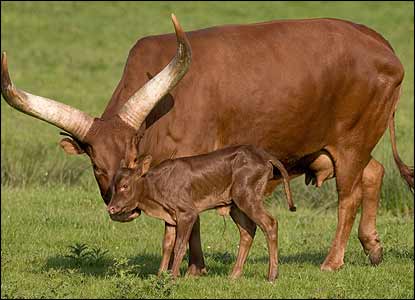
Ankoles are able to utilize poor quality forage and limited quantities of food and water. These survival abilities have allowed them as a breed to not only survive the centuries in Africa but to become established in Europe, South America, Australia and North America. Their life expectancy is more than 20 years.
The animals’ very large horns are honeycombed with blood vessels, and are used to thermo-regulate in hot temperatures. Blood moving through the horns is cooled by moving air, and then flows back into the body and lowers the animal’s body temperature.
The Ankole-Watusi is medium in size, with cows weighing 900–1,200 pounds and bulls weighing 1,200–1,600 pounds. Newborn calves weigh just 30–50 pounds and remain small for several months. This low birth-weight makes Ankole-Watusi bulls useful for breeding to first-calf-heifers of other breeds. During the day, the calves sleep together, with an “auntie” cow nearby for protection. At night, the herd-members sleep together, with the calves in the center of the group for protection. The horns of the adults serve as formidable weapons against any intruders.
Below shows Ankole cattle crossing a bridge in Epulu, Okapi Wildlife Reserve, eastern Congo. Filmed by WildlifeDirect in March 2007.
If you have problems seeing the video below click HERE
.youtube::fHlxH-wcL3M::
